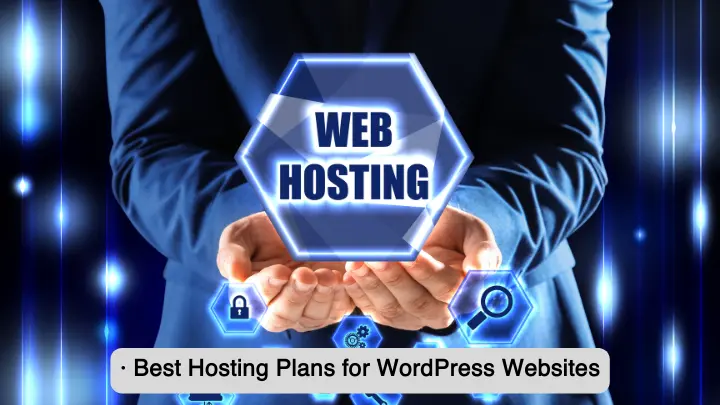Best Hosting Options for E-Commerce Websites
In the fast-paced world of online business, selecting the right hosting for your e-commerce website is crucial. The performance, security, and scalability of your hosting solution will directly impact the success of your online store. Whether you’re launching a new e-commerce site or upgrading your current one, choosing the best hosting option can help you ensure smooth operations, fast load times, and a seamless shopping experience for your customers.

This article will explore the best hosting options for e-commerce websites, their features, pros and cons, and the essential factors to consider when making your decision.
1. Shared Hosting
Shared hosting is one of the most affordable hosting solutions, where multiple websites share the same server resources. While this is a budget-friendly option, it may not always be suitable for large e-commerce sites due to limited resources and performance issues.
Key Features of Shared Hosting:
- Cost-Effective: Shared hosting is the cheapest hosting option, making it ideal for small or new e-commerce businesses.
- Pre-Configured Environment: Since the server is managed by the hosting provider, you don’t need to worry about server configurations.
- Basic Security Features: Shared hosting usually comes with standard security features like firewalls, but you’ll have less control over advanced configurations.
Advantages of Shared Hosting:
- 1.1 Affordable: Shared hosting is the least expensive option, which makes it accessible to small businesses and startups.
- 1.2 Easy to Use: No need for technical expertise, as the hosting provider handles server maintenance and management.
- 1.3 Pre-Installed Applications: Many shared hosting plans include one-click installations for popular e-commerce platforms like WooCommerce or Shopify.
Disadvantages of Shared Hosting:
- 1.4 Limited Resources: As your website grows, shared hosting may not provide sufficient resources to handle increased traffic.
- 1.5 Potential Performance Issues: Since multiple websites share the same server, performance can suffer if one site experiences high traffic.
- 1.6 Less Security Control: Shared hosting offers limited security customization, which may leave your site more vulnerable to attacks.
Shared hosting is a good option for small e-commerce businesses just starting out or for websites with minimal traffic. However, if you expect significant growth or traffic spikes, you may want to consider more scalable options.
2. Virtual Private Server (VPS) Hosting
VPS hosting is a step up from shared hosting, providing a virtual environment that mimics a dedicated server within a shared hosting setup. Each VPS is allocated specific resources, making it more reliable and customizable than shared hosting.
Key Features of VPS Hosting:
- Dedicated Resources: With VPS hosting, you get a specific allocation of CPU, RAM, and storage, ensuring more consistent performance.
- Scalability: VPS hosting allows you to scale your resources as your e-commerce site grows, making it a flexible solution.
- Greater Control: You have more control over server configurations compared to shared hosting, allowing for better performance tuning.
Advantages of VPS Hosting:
- 2.1 Better Performance: VPS hosting offers faster loading times and more stable performance due to dedicated resources.
- 2.2 Scalability: You can easily upgrade your VPS plan as your e-commerce business grows.
- 2.3 Improved Security: VPS hosting provides a more secure environment compared to shared hosting, with better control over firewalls and security configurations.
Disadvantages of VPS Hosting:
- 2.4 Higher Costs: VPS hosting is more expensive than shared hosting, but still more affordable than dedicated servers.
- 2.5 Requires Technical Knowledge: While VPS hosting gives you more control, it also requires some technical expertise for server management.
- 2.6 Limited Resources Compared to Dedicated Servers: Although VPS offers more resources than shared hosting, it may not be enough for very large e-commerce sites with high traffic.
VPS hosting is ideal for medium-sized e-commerce websites that need better performance and security without the cost of a dedicated server. It offers a balance between affordability, flexibility, and control.
3. Dedicated Server Hosting
Dedicated server hosting provides an entire physical server dedicated to your e-commerce website. This option is the most powerful and customizable, but also the most expensive. Large e-commerce websites with high traffic and complex requirements typically benefit from dedicated server hosting.
Key Features of Dedicated Server Hosting:
- Complete Control: You have full access to the server’s resources and configurations, allowing you to customize it according to your needs.
- Maximum Performance: Since you’re not sharing resources with other websites, dedicated servers offer the best performance.
- Enhanced Security: Dedicated hosting gives you complete control over your website’s security settings, allowing you to implement advanced protections.
Advantages of Dedicated Server Hosting:
- 3.1 Unmatched Performance: Dedicated servers provide the highest level of performance, making them ideal for large e-commerce websites with high traffic.
- 3.2 Full Customization: You have full control over server settings, allowing you to optimize it for your specific e-commerce needs.
- 3.3 Enhanced Security: Dedicated servers provide a higher level of security, with options for custom firewalls, encryption, and intrusion detection systems.
Disadvantages of Dedicated Server Hosting:
- 3.4 High Cost: Dedicated server hosting is the most expensive option, making it less suitable for small businesses or startups.
- 3.5 Requires Technical Expertise: Managing a dedicated server requires significant technical knowledge, or the cost of hiring IT staff or a managed hosting service.
- 3.6 Overkill for Small Sites: For smaller e-commerce websites, a dedicated server may offer more resources than needed, leading to unnecessary costs.
Dedicated server hosting is the best choice for large e-commerce websites that require maximum performance, customization, and security. It’s also the most scalable solution for businesses expecting significant growth and high traffic.
4. Cloud Hosting
Cloud hosting has become a popular choice for e-commerce websites due to its flexibility and scalability. Instead of relying on a single server, cloud hosting uses a network of servers to distribute resources, ensuring consistent performance and uptime.
Key Features of Cloud Hosting:
- Scalability on Demand: Cloud hosting allows you to scale your resources up or down as needed, making it ideal for e-commerce sites with fluctuating traffic.
- High Availability: Cloud hosting uses multiple servers, reducing the risk of downtime or data loss in case of a server failure.
- Cost-Effective: You only pay for the resources you use, making cloud hosting a cost-effective solution for businesses of all sizes.
Advantages of Cloud Hosting:
- 4.1 Flexibility: Cloud hosting allows you to quickly adjust resources based on traffic, ensuring optimal performance during peak shopping seasons.
- 4.2 Improved Uptime: With multiple servers supporting your website, cloud hosting provides better uptime and reliability.
- 4.3 Cost-Efficient: You only pay for the resources you use, which makes cloud hosting more affordable for growing businesses.
Disadvantages of Cloud Hosting:
- 4.4 Variable Costs: While cloud hosting is cost-efficient, the pricing can be unpredictable if your website experiences sudden traffic spikes.
- 4.5 Learning Curve: Managing a cloud hosting environment may require a learning curve, especially for those unfamiliar with cloud platforms.
- 4.6 Data Privacy Concerns: Since cloud hosting involves using third-party servers, some businesses may have concerns about data privacy and compliance.
Cloud hosting is a versatile option for e-commerce websites of all sizes. It’s particularly well-suited for businesses with fluctuating traffic or those expecting significant growth.
5. Managed Hosting for E-Commerce
Managed hosting is a service where the hosting provider takes care of all the technical aspects of running your server. This includes security, updates, backups, and performance optimizations. It can be offered with VPS, dedicated, or cloud hosting solutions.
Key Features of Managed Hosting:
- Hands-Free Management: The hosting provider handles server maintenance, security updates, and performance monitoring.
- 24/7 Support: Managed hosting typically includes around-the-clock support from the hosting provider’s technical team.
- Enhanced Security: Managed hosting providers offer advanced security features, including regular updates and monitoring.
Advantages of Managed Hosting:
- 5.1 No Technical Knowledge Required: Managed hosting is ideal for business owners who don’t have the time or expertise to manage a server.
- 5.2 Better Security: Hosting providers handle all security measures, ensuring your e-commerce site is protected from cyber threats.
- 5.3 High Performance: Managed hosting providers optimize the server for better performance, ensuring fast load times and minimal downtime.
Disadvantages of Managed Hosting:
- 5.4 Higher Cost: Managed hosting is more expensive due to the additional services provided by the hosting provider.
- 5.5 Limited Customization: Since the hosting provider manages the server, you may have limited control over specific configurations and software installations.
Managed hosting is perfect for e-commerce websites that prioritize performance, security, and convenience. It allows business owners to focus on their products and customers without worrying about server management.
6. Choosing the Best Hosting for Your E-Commerce Website
When deciding on the best hosting option for your e-commerce website, consider the following factors:
6.1 Traffic Volume
- Small businesses with low traffic may benefit from shared hosting.
- Medium to large websites with growing traffic should consider VPS or cloud hosting.
- High-traffic websites should opt for dedicated or cloud hosting.
6.2 Security Needs
- E-commerce websites require robust security due to the handling of sensitive customer data. Managed hosting, dedicated servers, or VPS hosting provide better security features compared to shared hosting.
6.3 Performance
- For fast load times and high performance, cloud hosting, dedicated servers, or VPS are better suited than shared hosting.
6.4 Budget
- Small e-commerce businesses may start with shared hosting, but as the website grows, it’s essential to upgrade to a more scalable solution.
6.5 Technical Expertise
- If you don’t have the technical expertise to manage a server, managed hosting is a hassle-free option, regardless of whether you choose VPS, dedicated, or cloud hosting.
Conclusion
Selecting the best hosting option for your e-commerce website depends on several factors, including traffic, security, performance, budget, and technical expertise. For small businesses, shared hosting may be a starting point, but as your site grows, upgrading to VPS, dedicated, or cloud hosting will ensure better performance and scalability. For those who prefer to focus on their business rather than server management, managed hosting is an excellent option, offering both convenience and security. By carefully evaluating your e-commerce website’s needs, you can choose the hosting option that will best support your business’s growth and success.
Common Questions
1. Which hosting option is the best for a small e-commerce website?
For small e-commerce websites, shared hosting is a budget-friendly option. However, if you expect to grow quickly, VPS hosting offers better performance and scalability.
2. What is the most secure hosting option for e-commerce sites?
Dedicated hosting and managed hosting provide the highest level of security, as they offer advanced security features and customization options.
3. Is cloud hosting suitable for large e-commerce websites?
Yes, cloud hosting is ideal for large e-commerce websites due to its scalability and high availability.
4. Do I need technical expertise to manage VPS or dedicated hosting?
Yes, VPS and dedicated hosting require some technical knowledge. If you lack the expertise, consider managed hosting, where the provider handles server management.
5. How much does managed hosting cost?
Managed hosting typically costs more than unmanaged options, but the price varies based on the hosting provider and the type of hosting (VPS, cloud, or dedicated).


